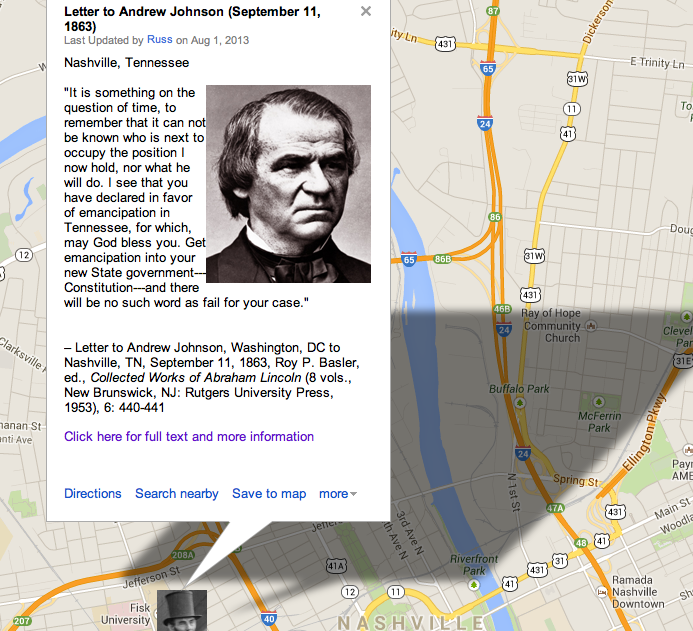Contributing Editors for this page include Brendan Birth
Ranking
#119 on the list of 150 Most Teachable Lincoln Documents
Annotated Transcript
On This Date
HD Daily Report, September 11, 1863
The Lincoln Log, September 11, 1863
Custom Map
How Historians Interpret
“Soon after his appointment by Lincoln as Tennessee’s governor, Johnson had allowed an election to go on as scheduled in Nashville for circuit court judge. There were two candidates: Unionist M. M. Brien and secessionist Turner S. Foster. Johnson was certain that citizens voting in secret and not intimidated by disunionists would put the loyal man on the bench. When Foster won by a large margin, Johnson was furious, vowing that there would be no more elections to fill local offices. Judge Foster was arrested, charged with treason, and confined in the penitentiary. A year later Abraham Lincoln gave the governor a few pointers on ‘reinaugurating a loyal State government.’ advice that by now Johnson no longer needed. ‘Let the reconstruction be the work of such men only as can be trusted for the Union,’ wrote Lincoln. ‘Exclude all others.’ Both men well understood that if free elections were permitted, the people would again choose to be free of the United States.”
–Walter Brian Cisco, War Crimes Against Southern Civilians (Gretna, LA: Pelican, 2007), 46
“During the early months of 1863, federal forces expanded their grip on central Tennessee, but the eastern section of the state—and Johnson’s hometown—remained in Confederate control. On June 1 Governor Harris, whose state government in rebellion had been driven from one town to another, attempted to nominate candidates for the Confederate congress. The convention met, only to be disrupted by the advance of federal forces. For Johnson, political matters went much better. A Unionist convention meeting in Nashville on July 1 passed a resolution approving Lincoln’s appointment of Johnson as military governor and praised the latter’s administration. The delegates also voided all actions of the Harris convention. Unionists asked Johnson to issue writs of election for the first week of August, but he declined, preferring to wait until guerrillas had been driven from east Tennessee so the entire state could participate in an election. In mid-August Major General Ambrose E. Burnside marched his army from Kentucky into east Tennessee. Simultaneously, Rosecrans advanced on General Braxton Bragg at Chattanooga, forcing the latter to draw reserves from Burnside’s line of march. On September 2, 1863, Burnside occupied Knoxville, and on the 9th, Rosecrans forced Bragg out of Chattanooga and into northern Georgia. In east Tennessee the mountaineers gave three cheers for the Union and three more for Andy Johnson. For them, the day of reconciliation had come. Lincoln reacted quickly to the good news and on September 11 telegraphed Johnson. . .”
–Chester G. Hearn, The Impeachment of Andrew Johnson (Jefferson, NC: McFarland & Co., 2000), 28
Close Readings
NOTE TO READERS
This page is under construction and will be developed further by students in the new “Understanding Lincoln” online course sponsored by the House Divided Project at Dickinson College and the Gilder Lehrman Institute of American History. To find out more about the course and to see some of our videotaped class sessions, including virtual field trips to Ford’s Theatre and Gettysburg, please visit our Livestream page at http://new.livestream.com/gilderlehrman/lincoln

